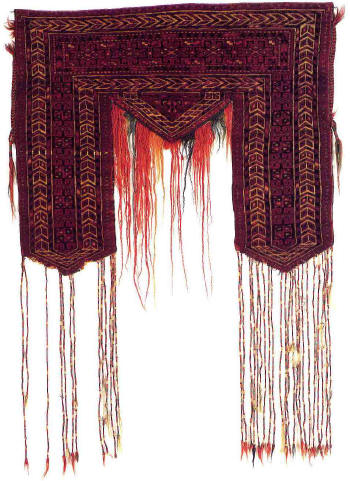| |
 |
|
| |
44
Bridal Camel Trapping (khalyk)
Sources agree that this oddly shaped article
was made as a wedding trapping, but whether it hung from the front
of the bride's litter or bedecked the chest of her camel is a matter
of debate. With its long, multicolored tassels, it must have added
to the festive air of the occasion. Although women of other Turkmen
tribes - Yomut and possibly Ersari - also wove khalyk, most of the
few pieces that survive were made by the Tekke. This one has typical
motifs: a horizontal panel of hooked x's and side flaps with a type
of cartouche seen on other Turkmen tribal weaving and even on
carpets from Turkey and the Caucasus (see, for example, cat. nos. 14
and 41). The ambiguity of the interlocking designs on this trapping
- for instance in the horizontal panel, where the x's visually
transform themselves into inward-pointing arrowheads - is evidence
of both the sophisticated Tekke weaving tradition and the weaver's
own skill. As an individual touch, she has included a few knots of
white cotton in the panel and side flaps of the khalyk and two tiny,
amulet-like diamonds of purple silk at the exact center of the top.
J.B. |
|
| |
|
|
|
|
| |
| SIZE: 38 x
27 in. (96.5x68.5 cm.) |
| WARP: wool, Z2S;
ivory |
| WEFT: wool, Z2S x
2; brown |
| PILE: wool, silk,
and cotton, Z2S, asymmetrical knots
open right, h. 13, v. 22, 286 k/sq. in., design woven
opposite direction to pile; wool: ivory, dark brown,
brown-red, orange-red, yellow, blue-green, dark blue;
cotton: white; silk: purple |
ENDS:
top: tassels
of 6 warps with multicolored wool
wrapping; bottom: ivory and red wool weft-faced
plain weave, folded under |
| SIDES: blue wool
overcast over 4 warps |
|
|
| |
|
|
|
|
THROUGH THE COLLECTOR'S EYE |
 |
|
Oriental Rugs from New England Private Collections |
| |
|
|
|